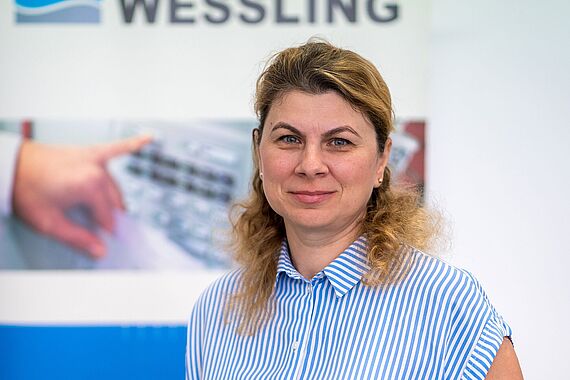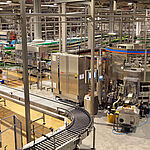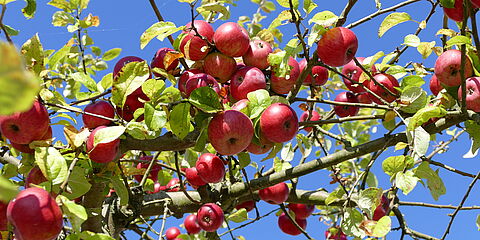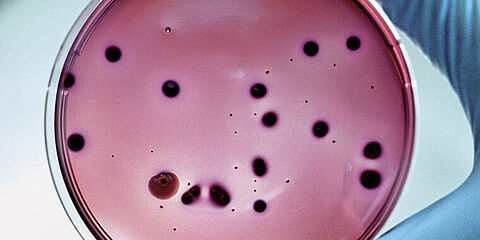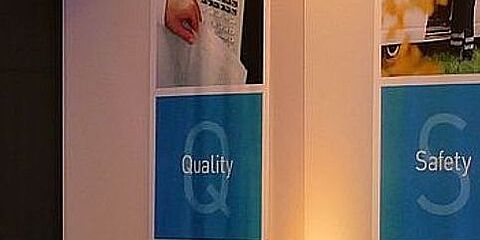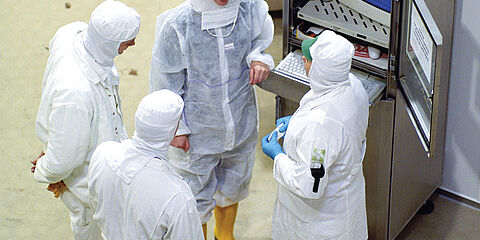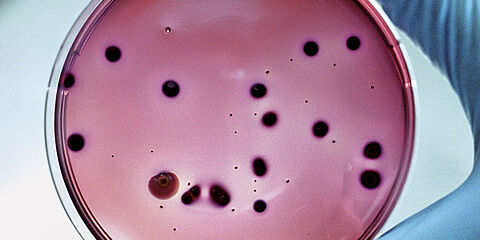Food analysis at WESSLING
The efficient and reliable analysis of WESSLING supports food manufacturers and suppliers of raw materials in complying with legal requirements and ensures the highest standards in the field of food safety.
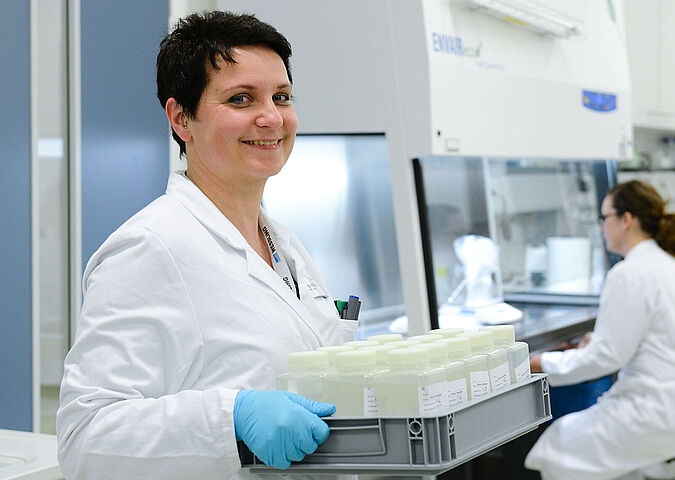
The long-term market success of food and the associated product brands depends to a large extent on their quality and safety, because consumers perceive and remember the quality or quality flaws of food in a very sensitive way.
We protect your brand for you as a food manufacturer or retailer and support you in meeting legal requirements by testing the quality and safety of your products in our accredited laboratories. Therefore we provide all methods of modern food analysis: from chemical-physical analysis to sensory tests to microbiological and molecular biological analyses and the identification of foreign bodies. Our competent experts will advise you comprehensively in the planning of sampling and analysis.
Food analysis: the services of WESSLING in detail
Food analysis: the services of WESSLING in detail
Chemical-physical analysis
Chemical-physical analysis
In our laboratories you will find highly qualified staff willing to advise you on choosing the best solutions for the safe evaluation of your food and feed.
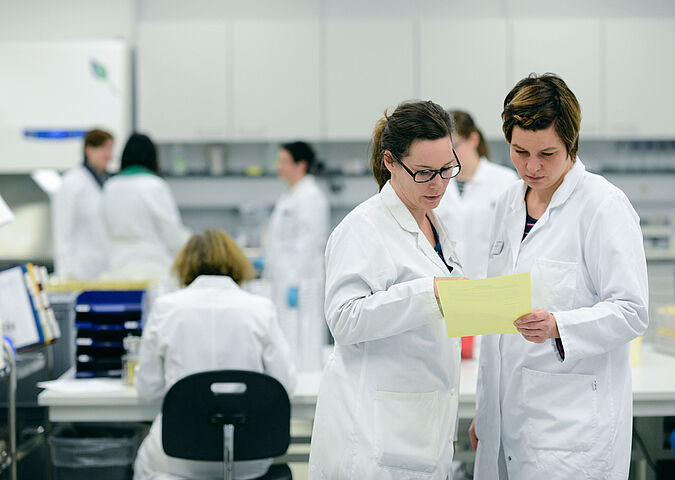
Our range of services:
- Organoleptic examination (Food, water)
- Egg freshness - ovoscopic examination (Eggs)
- Visual control of fish (Fish)
- Nominal table (Food, water)
- Filling content (Confectionery, sweet products)
- Weight determinations (Canned)
- Determination of wet gluten (Wheat and wheat flour)
- Determination of the gluten deformation index (Wheat and wheat flour)
- Determination of hectolitre weight (Cereals)
- Porosity determination (Bread and bread specialties)
- PH determination (Meat and meat products, milk and milk products, drinking water, wine, fruit juices)
- Determination of alkanility / acidity (Food, canned goods, drinks)
- Determination of humidity (Food, cereals, fodder)
- Determination of dry matter (Cheese, cheese specialties, by-products, ice cream)
- Determination of soluble dry matter (soft drinks, tomato paste, jams, sauces)
- Determination of total dry extract (Wine, ethyl alcohol, alcoholic beverages)
- Determination of soluble extract (Coffee and derivatives, tea)
- Determination of total ash (Food, cereals, fodder, coffee and derivatives, tea)
- Determination of ash insoluble in hydrochloric acid (Food, cereals, fodder, coffee and by-products, tea)
- Determination of impurities, foreign bodies (Food, cereals, food, coffee and derivatives, tea)
- Protein determination (Food, cereals)
- Determination of Collagen / Hydroxyproline (Meat Products)
- Determination of the Collagen / Protein Ratio (Meat Products)
- Fat content extraction Soxhlet (Foodstuffs)
- Fat content (Cheese, cheese specialties, milk, dairy products)
- Determination of the oxidation stage of the fat (Foodstuffs)
- Determination of lactose (Milk and derivatives)
- Determination of the total invert sugar content (Honey, sweet and pastry products)
- Diastatic Index (Honey, Inverted Sugar)
- Determination of sucrose (Honey, wine, alcoholic beverages)
- Determination of glucose and fructose (Honey)
- Determination of HMF (Honey)
- Content determination Pollen granules (Honey)
- Water insoluble substances (Honey)
- Fake identification (Honey)
- Starch identification (Foodstuffs)
- Identification of hydrogen sulphide (H2S) - fresh meat (Meat, meat products)
- Identification of ammonia-fresh meat (Meat, meat products)
- Determination of slightly hydrolysable nitrogen-fresh meat (Meat, meat products)
- Determination of sodium chloride (Foodstuffs)
- Determination of nitrogen (Meat, meat products)
- Determination of nitrates (Meat, meat products)
- Determination of iodine index (Fats of animal and vegetable origin)
- Determination of the peroxide index (Fats of animal and vegetable origin)
- Density determination - 20 grd C (Soft drinks, juices, milk, syrups)
- Determination of alcohol concentration (Alcoholic beverages, wine, ethyl alcohol)
- Determination of caffeine content (Coffee and derivatives)
- Determination of energy value (Foodstuffs)
- Determination of metals / heavy metals (Cd, Pb, Hg, Zn, Fe, Cu, Mn, Ca Na, K, P) (Food, cereals, feed, water)
Food analysis: the services of WESSLING in detail
Residues and contaminants
Residues and contaminants
The reliable detection of residues and contaminants in food places the highest demands on laboratory analysis. Thanks to our state-of-the-art equipment, WESSLING experts examine raw materials and products using multi or individual methods.
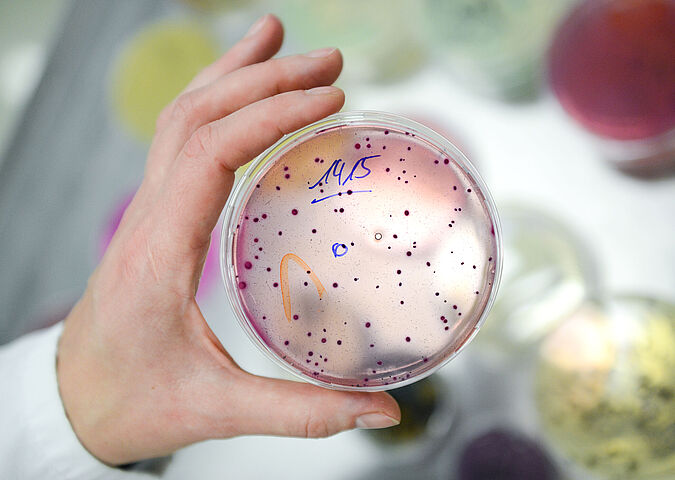
Our range of services:
- Dioxins and polycyclic biphenyls (dl-PCB, ndl-PCB)
- Mycotoxins
- Chlorate, perchlorate
- Heavy metals
- Polycyclic aromatic hydrocarbons (PAHs)
- Pharmacologically active substances (human and veterinary medicines)
- Quaternary ammonium compounds (QAV (DDAC, BAC))
- Phthalates
- Mineral oil components (MOSH/MOAH)
- Process contaminants
Food analysis: the services of WESSLING in detail
Sensory tests
Sensory tests
The quality of a food and its consistent sensory profile play a decisive role in the consumer's purchasing habits and acceptance of a product.
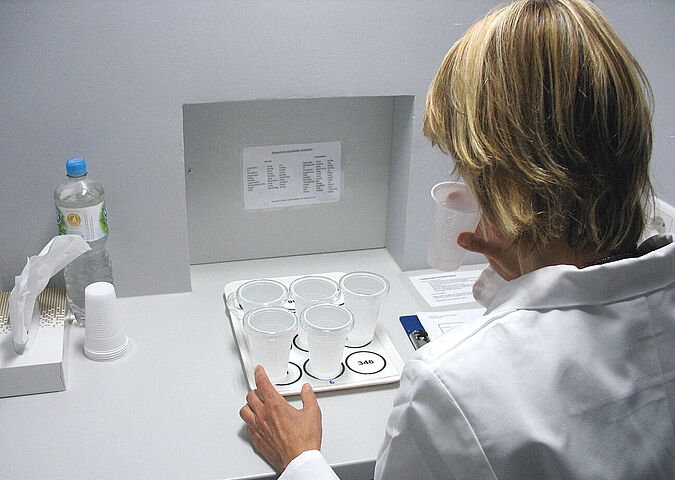
Our range of services:
- Descriptive tests
- Suitability tests for human consumption
- Difference test
- Triangle test
- Popularity test
- Training courses at WESSLING Academy, also in-house
Food analysis: the services of WESSLING in detail
Molecular biological analysis
Molecular biological analysis
In order to achieve the shortest possible testing times for our customers, WESSLING Laboratories use modern protein and nucleic acid analysis methods such as PCR, DNA sequencing and immunoenzymatic investigations (ELISA).
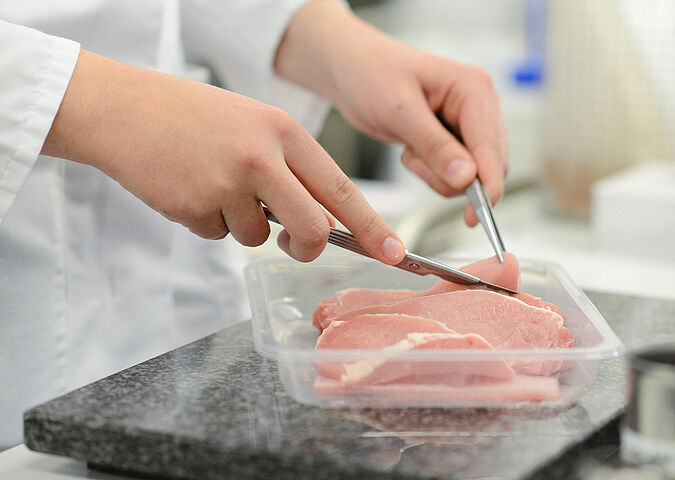
Our range of services:
- Animal species determination
- Genetically modified organisms (GMO)
- Allergens
- Bacteriotoxins
- Proof of risk material (CNS)
Food analysis: the services of WESSLING in detail
Identification of foreign bodies
Identification of foreign bodies
Physical solids which are not part of the recipe and can be sensory detected are named as foreign bodies in food.
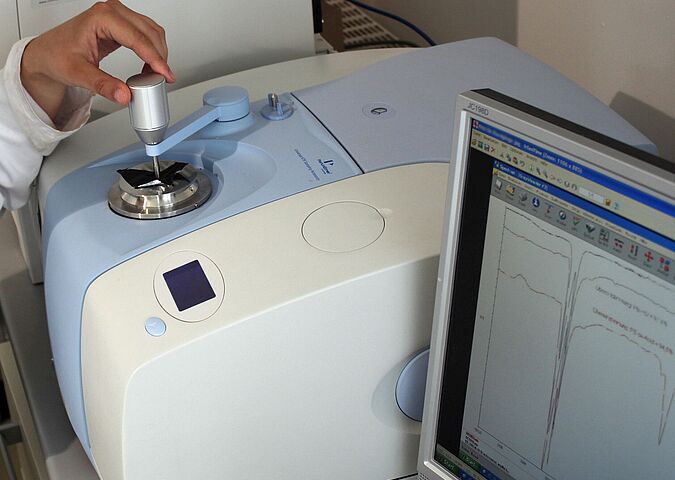
Our range of services:
- Documentation of dimensions
- Photographic documentation of buildup or striking deformations
- Visual inspection for a rough classification of the material
- Light microscopic examination of biological materials and powdery foreign bodies to identify amorphous or crystalline structures
- FT-IR spectroscopy for a non-destructive examination of plastics, e.g. foils, or hard plastic particles
- ATR technology to identify the type of polymer and additives, e.g. plasticisers for homogeneous materials
- EDX to identify glass particles, metallic or mineral foreign bodies or other predominantly inorganic particles, identification of elements from atomic number 5 (boron), quantification from atomic number 11 (sodium)
- SEM images for further information on the microstructure of a foreign body
- X-ray fluorescence analysis (XRF) or mass spectrometry with inductively coupled plasma (ICP-MS) to examine element composition
- Molecular biological analysis of animal or plant fragments, either via species-specific polymerase chain reaction (PCR) or via PCR-RFLP (restriction fragment length polymorphism)
Food analysis: the services of WESSLING in detail
Microbiological analysis
Microbiological analysis
One of the most important criteria for the marketability of a food product is that it is microbiologically safe. The WESSLING Group has very efficient microbiological laboratories for food and feed testing.

Our range of services:
Food microbiological analysis
- Determinare NTG
- Determinare Bacterii coliforme
- Determinare Escherichia coli
- Determinare Salmonella spp.
- Determinare Enterobacteriaceae
- Determinare Listeria monocytogenes
- Determinare Bacillus cereus
- Determinare Drojdii și Mucegaiuri
- Determinare Stafilococ coagulazo-pozitiv
- Determinare Bacterii Aerobe și Anaerobe Mezofile
- Determinare Bacterii Acidolactice Mezofile
- Determinare Bacterii Sulfit Reducătoare
- Determinare Clostridium perfringens
Sanitation tests
- NTG determination
- Determination of Coliform Bacteria
- Coagulase-positive Staphylococcus determination
- Determination of Enterobacteriaceae
- Determine Salmonella spp.
- Determination of yeasts and molds
- Determination of Listeria monocytogenes
Aeromicroflora
- Determination of NTG (Room)
- Mold Determination (Room)
Water microbiological analysis
- NTG determination at 22oC and 37oC
- Determination of Coliform Bacteria
- Determine Escherichia coli
- Determine intestinal enterococci
- Determining Pseudomonas aeruginosa
- Salmonella fast analysis
The bacteria can be detected in 24 hours
The foods most commonly infected with Salmonella are beef, poultry, milk and eggs. The infested food usually looks and smells normal. Salmonella infection is not life threatening. But for certain categories of people, such as young children, the elderly, transplants, pregnant women, immunocompromised persons, complications may occur.
Our microbiology laboratory in Bucharest can detect possible contamination due to a new fast method of detecting Salmonella spp. The advantage of using this technique is the ability to obtain results within 24 hours for Salmonella spp.
This technique is validated by the European Organization of AFNOR validation
This reliable technique is validated by the European Organization for the validation of AFNOR, in accordance with SR EN / ISO 16140. The degree of adequacy for the new fast method has been demonstrated by the WESSLING Romanian laboratory and validated internally, compared to the classical method for detecting Salmonella spp. The new method is RENAR accredited for the matrix of meat, meat products and preparations.
Our specialists provide solutions for your industry
WESSLING provides individual service packages that are tailored to the needs of your company.
Contact:
- Veronica Dumitru
- +4 0728 293 555
- food@wessling.ro
